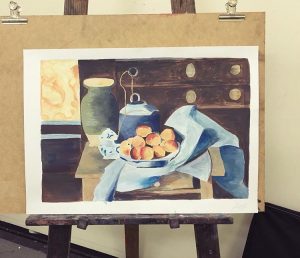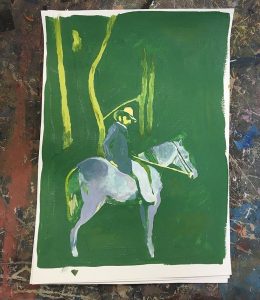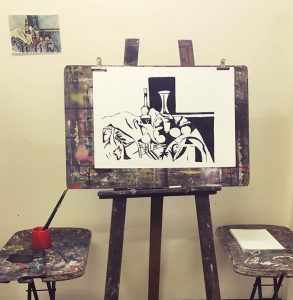I recently completed an 8-week intensive Drawing and Painting Class at Melbourne Studio of Art (taught by Geoff Dupree) and, above all, I was surprised and motivated by the number of truly significant “ah-ha” philosophical learnings that came about purely as a result of teacher-student conversations happening around me. Yes, we learned how to draw and how to paint (tick), but there was this unexpected element brought about by the constant verbal soundtrack in the background over the hours and hours in the classroom. Students were asking questions related to the art work, and the coaching and discussion that followed seemed to be so applicable in broader life, not just in ‘art’. Let me explain what I mean with some specific examples;
“Come back to it, take a break from it, take another look at it in days, or even weeks later”
I overheard our teacher Geoff saying this to one of the other students and it seems to be applicable beyond the artwork in question. My take (as an eavesdropper) was that the recommendation is to walk away from something (art, or a problem, a goal, a project, a situation or relationship) and come back to it again and again over time – taking various ‘breaks’ from it so that your perspective has time to adjust, settle and re form. This is really interesting if you think about it for a moment, because you as a person will change, however so slightly, in a day or week or month, so you actually get a ‘new’ or different version of yourself to take a look at what’s in front of you if you leave it, walk away, come back (in time) and look again, and again. Sometimes we feel things need to move quickly in order to progress or be resolved, but perhaps giving permission of ‘time’ & adjusted points of view is in fact the progress that needs to take place.
We had this constant advice, in class, not to try and fix problems or finish art-work in the hours that were directly in front of us that day, but rather consider the process of art as longer term… perhaps this is something we can apply more broadly in life. We may have situations we’re in that we feel need to have action taken imminently in order to be addressed (relationships with people, feelings of insecurity or uncertainty, setting and achievement of goals), but perhaps if taking and accepting a longer term process, we might view different angles of the situation.

“Make a decision and go with it fully, one way or another” (this actually reminds me of a similar learning from my recent improvisation comedy course, which was, “commit or you’re fuck*ed”.
The idea here was to avoid being “fluffy”, that is, to avoid making pencil lines or brush strokes willy-nilly, or without absolute intent. There’s a risk, in art, that the artist can make some moves and decisions without really knowing what function or purpose they serve in the art. Sure, there is probably merit to this approach for abstract art – but for this particular course we were creating art work from still life, and therefore needed to be quite decisive in our approach. So when thinking about this with regards to life in a broader sense, I understood it to be avoiding ‘floating’ and going with the flow when it comes to the big decisions that affect your life’s path. Just like abstract art, there’s a time and place to let go and let the universe do it’s thing, but on the flip side, having sound intent will provide confidence and security in one’s “moves’ through life. I feel like this particular piece of advice would help us avoid wondering where the months and years have gone and rather being the master of our own journeys (with full accountability and therefore reward when things begin coming to fruition).

“A clear work station for art tools makes for a clear mind for creating the art.”
This was a very simple one but something our teacher swore by. No major philosophical interpretation required for how this one applies in life… organise the space around you at work and home so that the important things have space to occur fluidly, without clutter blocking the flow.
“Take it down to black or white… if you’re looking at something and re-creating it in black and white, would elements be black, or would they be white? This forces decisiveness, resulting in painting well, even if you make some seemingly ‘wrong’ choices.”

This particular process, of taking things down to either black or white was initially frustrating… because there was a degree of certainty that grey was needed, which had to be forcibly broken through. I can’t believe how difficult it was to determine whether certain elements should be black or white… but no matter how difficult the decision, a decision needed to be made. Perhaps this approach is sometimes required, in looking at situations in life – is something positive or negative? Is it good or bad, is it dead or still alive? Forcing us to ask ourselves to view things in absolute terms (one way or another) might be difficult, but could also help paint the right picture overall.
Leave a Reply